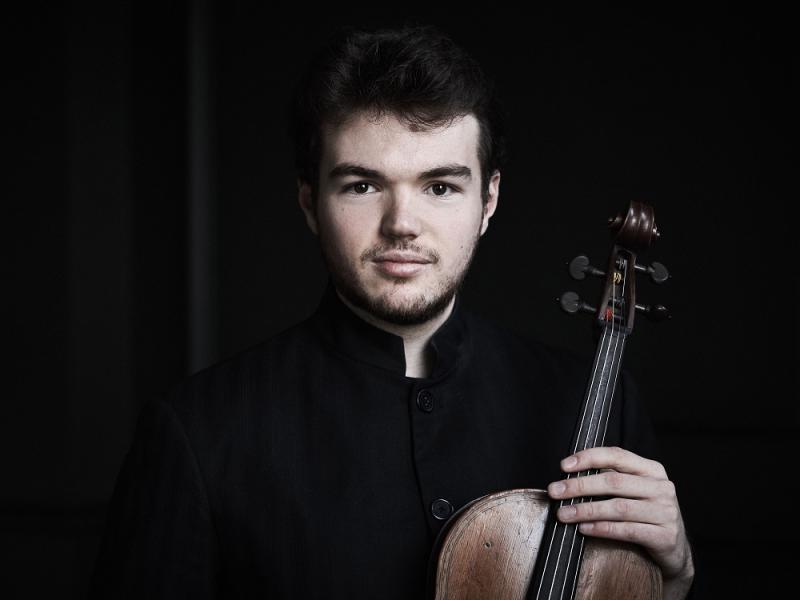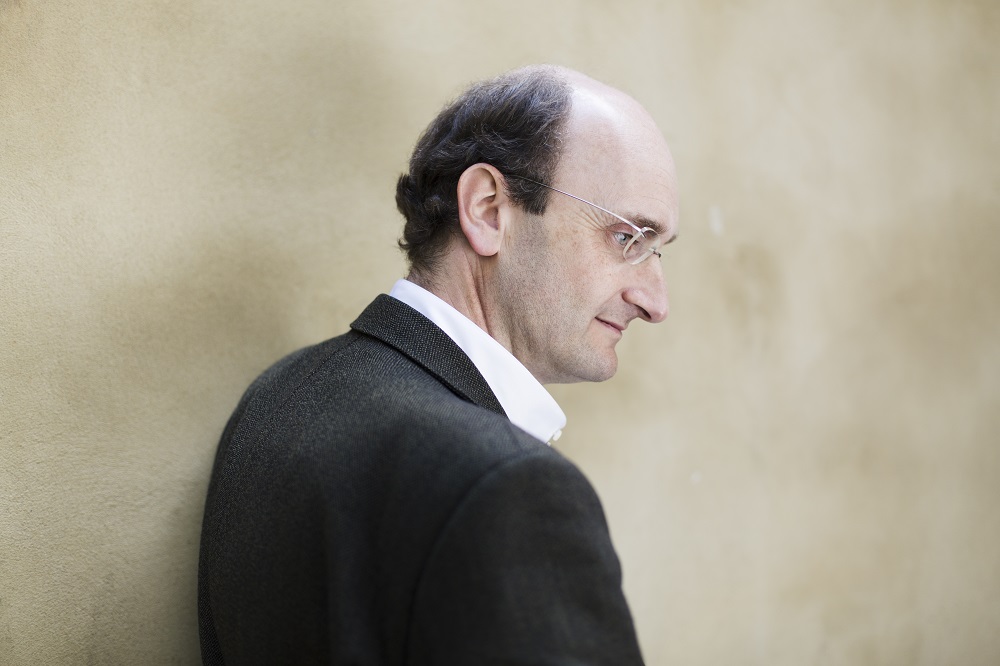Ridout, SCO, Manze, Queen’s Hall, Edinburgh review - sensual mystery and searing intensity | reviews, news & interviews
Ridout, SCO, Manze, Queen’s Hall, Edinburgh review - sensual mystery and searing intensity
Ridout, SCO, Manze, Queen’s Hall, Edinburgh review - sensual mystery and searing intensity
Welcome return for an imaginative programmer of British music from Dowland to Clyne

The programme for this concert had Andrew Manze’s fingerprints all over it. Of all the Scottish Chamber Orchestra’s semi-regular guest conductors, he’s the one who most consistently delivers on the highest level. A thinker to his fingertips, he constructs programmes as intelligently as he plays them.
So what a wonderful idea to begin with music by Grace Williams and end with music by her teacher, Ralph Vaughan Williams. I wasn't familiar with Grace Williams’ music before this concert, but even if you didn’t know the connection you could hear some of RVW’s influence in the way she uses a string orchestra in her Sea Sketches. Indeed, you can almost sense the buzzing of RVW’s The Wasps in Grace’s rippling waves, and there’s a dusky, autumnal tinge to the string sound the even carries hints of Finzi. She’s no one’s imitator, though, and her five sea pictures are masterpieces of variety, the calmer moments inhabiting a quiet melancholy, while the faster movements swirl like a dangerous perpetuum mobile.  It’s a world away from the sensual mystery of RVW’s Flos Campi, but both were played with exquisite delicacy by the reduced forces of the SCO, the air around the sound as important a part of the experience as the actual notes. Manze (pictured above by Benjamin Ealovega) shaped the sound to perfection, everything expertly integrated. The singers of the SCO Chorus got the tone just right, by turns rich, alluring or ardent; and Timothy Ridout’s viola surged in and out of the texture in a way that brought it to life without drawing attention to himself.
It’s a world away from the sensual mystery of RVW’s Flos Campi, but both were played with exquisite delicacy by the reduced forces of the SCO, the air around the sound as important a part of the experience as the actual notes. Manze (pictured above by Benjamin Ealovega) shaped the sound to perfection, everything expertly integrated. The singers of the SCO Chorus got the tone just right, by turns rich, alluring or ardent; and Timothy Ridout’s viola surged in and out of the texture in a way that brought it to life without drawing attention to himself.
You could say that last aspect is part of a violist’s job description, but Ridout was very much the centre of attention in a searing performance of Britten’s Lachrymae that treated Britten’s Dowland variations like a revolving kaleidoscope of expression. Expression, but not of colour: there was a dusky-grey hue over the whole sound picture as though to reinforce the darkness of both the music and the mood; but Ridout and Manze conspired with the SCO strings to create something that moved from dark shuddering and detached melancholy through swirling drama and histrionic intensity. That they preceded it with an arrangement of the song that inspired Britten, Dowland’s If my complaints could passions move, added to the focused intensity of the listening experience.  Perhaps surprisingly, the thing on the programme that came closes to relaxed listening was The Years, a new work from Anna Clyne (pictured above by Christine Kernohan). She’s the SCO’s Associate Composer, and for this choral cycle she collaborated with poet Stephanie Fleischmann to create a reflection on the passing of time, inspired partly by the experience of lockdown. Clyne’s response to the poetry is warm, tonal and accessible. The poems flow into one another but in different ways, mirroring the experience of time: we all have the same 24 hours, but it goes as slowly or as quickly as any individual’s experience.
Perhaps surprisingly, the thing on the programme that came closes to relaxed listening was The Years, a new work from Anna Clyne (pictured above by Christine Kernohan). She’s the SCO’s Associate Composer, and for this choral cycle she collaborated with poet Stephanie Fleischmann to create a reflection on the passing of time, inspired partly by the experience of lockdown. Clyne’s response to the poetry is warm, tonal and accessible. The poems flow into one another but in different ways, mirroring the experience of time: we all have the same 24 hours, but it goes as slowly or as quickly as any individual’s experience.
The musical textures are appealing and melodic, and its overall atmosphere is appealing; but something about it didn’t grab me. Several of Clyne’s previous works have really forced me to listen, but this one seemed to be happening almost in the background. The gentleness of the overall tone made it diverting rather than gripping, and Clyne seemed to use a rather limited musical palette which made the music a touch repetitious in places. By the time we got to the end of the musical journey, I wasn’t convinced we’d really travelled all that far.
rating
Explore topics
Share this article
The future of Arts Journalism
You can stop theartsdesk.com closing!
We urgently need financing to survive. Our fundraising drive has thus far raised £49,000 but we need to reach £100,000 or we will be forced to close. Please contribute here: https://gofund.me/c3f6033d
And if you can forward this information to anyone who might assist, we’d be grateful.

Subscribe to theartsdesk.com
Thank you for continuing to read our work on theartsdesk.com. For unlimited access to every article in its entirety, including our archive of more than 15,000 pieces, we're asking for £5 per month or £40 per year. We feel it's a very good deal, and hope you do too.
To take a subscription now simply click here.
And if you're looking for that extra gift for a friend or family member, why not treat them to a theartsdesk.com gift subscription?
more Classical music
 BBC Proms: Moore, LSO, Bancroft review - the freshness of morning wind and brass
English concert band music...and an outlier
BBC Proms: Moore, LSO, Bancroft review - the freshness of morning wind and brass
English concert band music...and an outlier
 Willis-Sørensen, Ukrainian Freedom Orchestra, Wilson, Cadogan Hall review - romantic resilience
Passion, and polish, from Kyiv's musical warriors
Willis-Sørensen, Ukrainian Freedom Orchestra, Wilson, Cadogan Hall review - romantic resilience
Passion, and polish, from Kyiv's musical warriors
 BBC Proms: The Marriage of Figaro, Glyndebourne Festival review - merriment and menace
Strong Proms transfer for a robust and affecting show
BBC Proms: The Marriage of Figaro, Glyndebourne Festival review - merriment and menace
Strong Proms transfer for a robust and affecting show
 BBC Proms: Faust, Gewandhausorchester Leipzig, Nelsons review - grace, then grandeur
A great fiddler lightens a dense orchestral palette
BBC Proms: Faust, Gewandhausorchester Leipzig, Nelsons review - grace, then grandeur
A great fiddler lightens a dense orchestral palette
 BBC Proms: Jansen, Royal Concertgebouw Orchestra, Mäkelä review - confirming a phenomenon
Second Prom of a great orchestra and chief conductor in waiting never puts a foot wrong
BBC Proms: Jansen, Royal Concertgebouw Orchestra, Mäkelä review - confirming a phenomenon
Second Prom of a great orchestra and chief conductor in waiting never puts a foot wrong
 BBC Proms: Royal Concertgebouw Orchestra, Mäkelä review - defiantly introverted Mahler 5 gives food for thought
Chief Conductor in Waiting has supple, nuanced chemistry with a great orchestra
BBC Proms: Royal Concertgebouw Orchestra, Mäkelä review - defiantly introverted Mahler 5 gives food for thought
Chief Conductor in Waiting has supple, nuanced chemistry with a great orchestra
 Dunedin Consort, Butt / D’Angelo, Muñoz, Edinburgh International Festival 2025 review - tedious Handel, directionless song recital
Ho-hum 'comic' cantata, and a song recital needing more than a beautiful voice
Dunedin Consort, Butt / D’Angelo, Muñoz, Edinburgh International Festival 2025 review - tedious Handel, directionless song recital
Ho-hum 'comic' cantata, and a song recital needing more than a beautiful voice
 Classical CDs: Dungeons, microtones and psychic distress
This year's big anniversary celebrated with a pair of boxes, plus clarinets, pianos and sacred music
Classical CDs: Dungeons, microtones and psychic distress
This year's big anniversary celebrated with a pair of boxes, plus clarinets, pianos and sacred music
 BBC Proms: Liu, Philharmonia, Rouvali review - fine-tuned Tchaikovsky epic
Sounds perfectly finessed in a colourful cornucopia
BBC Proms: Liu, Philharmonia, Rouvali review - fine-tuned Tchaikovsky epic
Sounds perfectly finessed in a colourful cornucopia
 BBC Proms: Suor Angelica, LSO, Pappano review - earthly passion, heavenly grief
A Sister to remember blesses Puccini's convent tragedy
BBC Proms: Suor Angelica, LSO, Pappano review - earthly passion, heavenly grief
A Sister to remember blesses Puccini's convent tragedy
 BBC Proms: A Mass of Life, BBCSO, Elder review - a subtle guide to Delius's Nietzschean masterpiece
Mark Elder held back from blasting the audience with a wall of sound
BBC Proms: A Mass of Life, BBCSO, Elder review - a subtle guide to Delius's Nietzschean masterpiece
Mark Elder held back from blasting the audience with a wall of sound
 BBC Proms: Le Concert Spirituel, Niquet review - super-sized polyphonic rarities
Monumental works don't quite make for monumental sounds in the Royal Albert Hall
BBC Proms: Le Concert Spirituel, Niquet review - super-sized polyphonic rarities
Monumental works don't quite make for monumental sounds in the Royal Albert Hall

Add comment